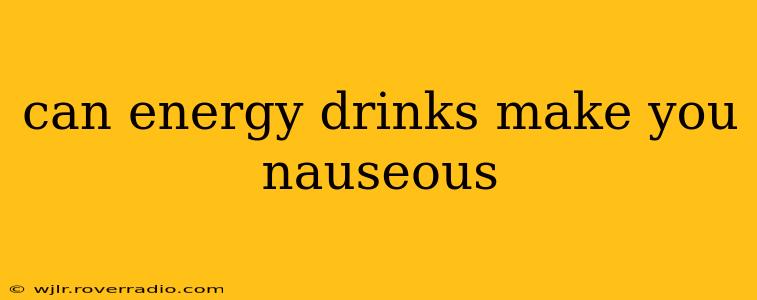Yes, energy drinks can definitely make you nauseous. While they're marketed as a quick pick-me-up, the high concentration of caffeine, sugar, and other stimulants can have unpleasant side effects for many people. This isn't just a minor inconvenience; understanding the reasons behind energy drink-induced nausea is crucial for making informed choices about your consumption.
Why Do Energy Drinks Cause Nausea?
The nausea associated with energy drinks stems from a combination of factors:
-
High Caffeine Content: Caffeine is a stimulant that can, in high doses, trigger nausea and vomiting. The amount of caffeine in a single energy drink often far surpasses that found in a cup of coffee, leading to an overwhelming effect on the nervous system for some individuals. This is especially true if you're not accustomed to consuming large amounts of caffeine.
-
High Sugar Content: Many energy drinks are loaded with sugar. This rapid surge in blood sugar can lead to digestive upset, including nausea, particularly in individuals sensitive to sugar or those with underlying conditions like diabetes. The body struggles to process the large amount of sugar quickly, leading to discomfort.
-
Other Stimulants: In addition to caffeine, many energy drinks contain other stimulants like guarana or taurine. These substances, while potentially offering benefits in moderation, can contribute to the overall stimulating effect and increase the likelihood of nausea, especially when combined with caffeine and sugar.
-
Dehydration: The diuretic effect of caffeine can lead to dehydration, which is a common cause of nausea. Dehydration throws off your body's electrolyte balance, potentially leading to feelings of sickness.
-
Individual Sensitivities: It's important to remember that everyone reacts differently to energy drinks. Some individuals are far more sensitive to the effects of caffeine and sugar than others. Pre-existing health conditions can also exacerbate the negative effects.
How Much Caffeine is Too Much?
There's no single answer to how much caffeine is "too much," as it depends on individual tolerance, metabolism, and other factors. However, exceeding 400 milligrams of caffeine per day is generally considered excessive for most adults and can significantly increase the risk of experiencing negative side effects like nausea, anxiety, and insomnia. Always check the nutrition label of your energy drink to understand its caffeine content.
What to Do if an Energy Drink Makes You Nauseous?
If you experience nausea after consuming an energy drink, there are several things you can try:
-
Hydrate: Drink plenty of water to help rehydrate your body and flush out the stimulants.
-
Rest: Allow your body time to recover from the stimulant overload.
-
Eat something bland: A simple cracker or piece of toast can help settle your stomach.
-
Avoid further consumption: Don't reach for another energy drink.
-
Seek medical attention: If your nausea is severe or persistent, seek medical attention.
Can I Still Drink Energy Drinks Occasionally?
Moderate consumption of energy drinks might be acceptable for some individuals, but it's crucial to be mindful of the potential risks. Limit your intake, pay attention to how your body reacts, and consider opting for alternatives like water, tea, or coffee in moderation.
Other Common Questions:
Are energy drinks worse than coffee?
While both contain caffeine, energy drinks typically have higher concentrations of caffeine and sugar, as well as other stimulants, potentially making them more likely to cause negative side effects like nausea. The quicker absorption of caffeine in energy drinks can also contribute to a more intense response.
Can I mix energy drinks with alcohol?
Mixing energy drinks with alcohol is strongly discouraged. The combination masks the intoxicating effects of alcohol, leading to excessive consumption and increased risk of alcohol poisoning. Furthermore, the combined effects on your body can exacerbate nausea and other unpleasant side effects.
Are sugar-free energy drinks better?
Sugar-free energy drinks eliminate the sugar-related nausea, but they still contain high levels of caffeine and other stimulants, which can still trigger nausea in susceptible individuals. The artificial sweeteners in some sugar-free versions can also cause digestive issues in certain people.
By understanding the potential causes and effects, you can make informed choices about your energy drink consumption and minimize the risk of experiencing unpleasant symptoms like nausea. Remember, moderation is key, and if you consistently experience negative side effects, it’s best to avoid energy drinks altogether.
